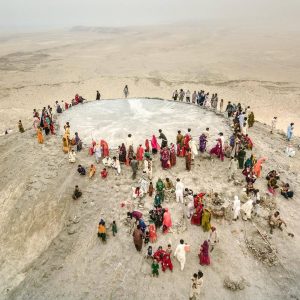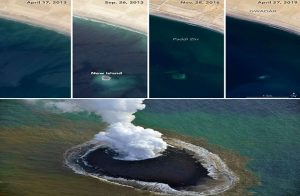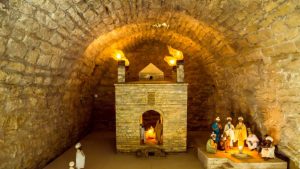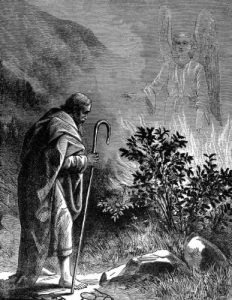25 September 2013 (14:43 UTC-07 Tango)/20 Dhu ‘l-Qa’da 1434/03 Mehr 1391/21 Xin-You (8th month) 4711
In Baluchistan Province, there juts out into the Arabian Sea a free trade port called Gwadar. About 600 meters (1968 feet) away a new island emerged, within 30 minutes of yesterday’s 7.8 magnitude quake.
Along with the island fire is bursting forth, explorers found lots of dead fish.
The island is 60 meters (196.8 feet) long and 20 meters (65.6 feet) above water level at its highest point. Explorers said there are lots of dead fish floating around the island, and they smelled methane bubbling up from the sea. They set it on fire to be sure it was gas, and it was.
Locals say this has happened before, right after a big earthquake in 1960. The island in that quake was further to the east. Officials with Pakistan’s National Institute of Oceanography say yesterday’s island creation is the fourth since 1945. However, these islands are temporary and end up eroding back into the sea, because they’re basically balls of mud.
Pakistan is part of the Indian subcontinent, which is smashing up against the Asian continent. The ongoing slow impact of the continents create the Himalayas.
Pakistani scientists revealed that the impact of the two continents is also releasing untold amounts of natural gas, from massive deposits underground.
This could explain the origins of the fire worshiping religions, such as Zoroastrianism and some Hindi religions.  Still today, Hindus make a pilgrimage to a mud volcano called Chandragup. It’s fueled by natural gas. A nearby cave is also a holy site, where the immortal flame burns.
Still today, Hindus make a pilgrimage to a mud volcano called Chandragup. It’s fueled by natural gas. A nearby cave is also a holy site, where the immortal flame burns.
I recently saw a travel show, which revealed that the eternal flame at a Zoroastrian fire temple, in Pakistan, was built over a natural gas vent.
Archaeologists think the religion of fire worship, begun by Indo-Iranians several thousands of years ago, is also the source for the idea of cremating the dead.
Zoroastrians don’t actually worship fire as ‘god’, but see it as a symbol of god’s purity. Hindi beliefs say fire is the mediator between people and gods. Let’s not forget the Hebrews, who’s leader Moses conversed with god, but only through a burning bush.
This brings me to question Moses. He was probably high on the natural gas escaping from a vent on the mountain, then something caused the gas to ignite (maybe Moses trying to start a camp fire?).
 This brings me to the Oracles (fortune tellers) of ancient Greece. The most accurate oracles lived in caves. Researchers now believe these caves were natural gas vents, and that the women were high on gas (hence they were ‘full of hot air’).
This brings me to the Oracles (fortune tellers) of ancient Greece. The most accurate oracles lived in caves. Researchers now believe these caves were natural gas vents, and that the women were high on gas (hence they were ‘full of hot air’).
The oracle at Delphi must’ve known something was going on in the cave, because she limited her fortune telling to once every seven days. Was the vent gassing off only once per week?
Isn’t the origin of religion funny? (like laughing gas, hippy-crack aka nitrous oxide) Too bad those ancient people didn’t think of bottling up that natural gas and selling it for home and commercial use, instead of thinking it was god talking to them! Still, it doesn’t ‘splain why some of those Greek Oracles were so accurate in their predictions, unless certain types of natural gas are the secret ingredient used to connect your mind to the space time continuum, thus revealing the future?


